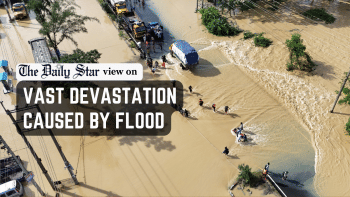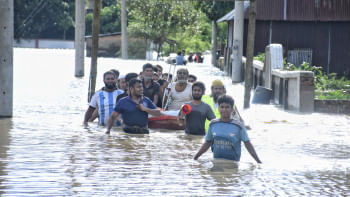Flood-hit people need urgent support

While people in many districts are still reeling from the fallout of the August floods—deemed by some as the worst in the country since 1988—reports say that recent occurrences of heavy rainfall and onrush of water from upstream have yet again inundated vast tracts of areas in northern districts, marooning over 60,000 people in Lalmonirhat and Kurigram as of Sunday night. Many low-lying areas in Rangpur and Nilphamari have also been flooded. As a result, many of the affected have had to leave their homes, taking shelter on roads and embankments. Moreover, thousands of hectares of croplands, including Aman and vegetable fields, have been submerged. The Flood Forecasting and Warning Centre has said the situation may improve by Tuesday, but if water does not begin to recede as expected, it may damage early-winter crops. This needs immediate action from the authorities.
The question is, how prepared is the government to deal with such frequent floods and the devastations caused by them? Its response to the August flood has been often slow and ineffective, with the rehabilitation programmes for victims yet to begin. The priority now is to provide those stranded in the four northern districts with shelter, food and drinking water, and necessary medicine. They will also require help to protect their livestock and poultry as their livelihoods depend on them. Once floodwaters recede, there will be the gargantuan challenge of rehabilitation, reconstructing their homes and repairing damaged infrastructure, including roads and embankments, etc. The affected, especially those in worst-hit areas, will also need financial support to rebuild.
The government's proactive role in these endeavours is crucial. The NGOs and wider society should also come forward to support these endeavours. During the devastating flood of August, we saw how people from all walks of life came forward to support the victims. However, coordination became a big issue in conducting relief operations in remote areas with the local administrations struggling to do their part. Therefore, the government must take lessons from these shortcomings and prepare to efficiently support the victims this time. It also must build a robust flood management and rehabilitation system for dealing with such natural disasters in the future.


 For all latest news, follow The Daily Star's Google News channel.
For all latest news, follow The Daily Star's Google News channel. 









Comments